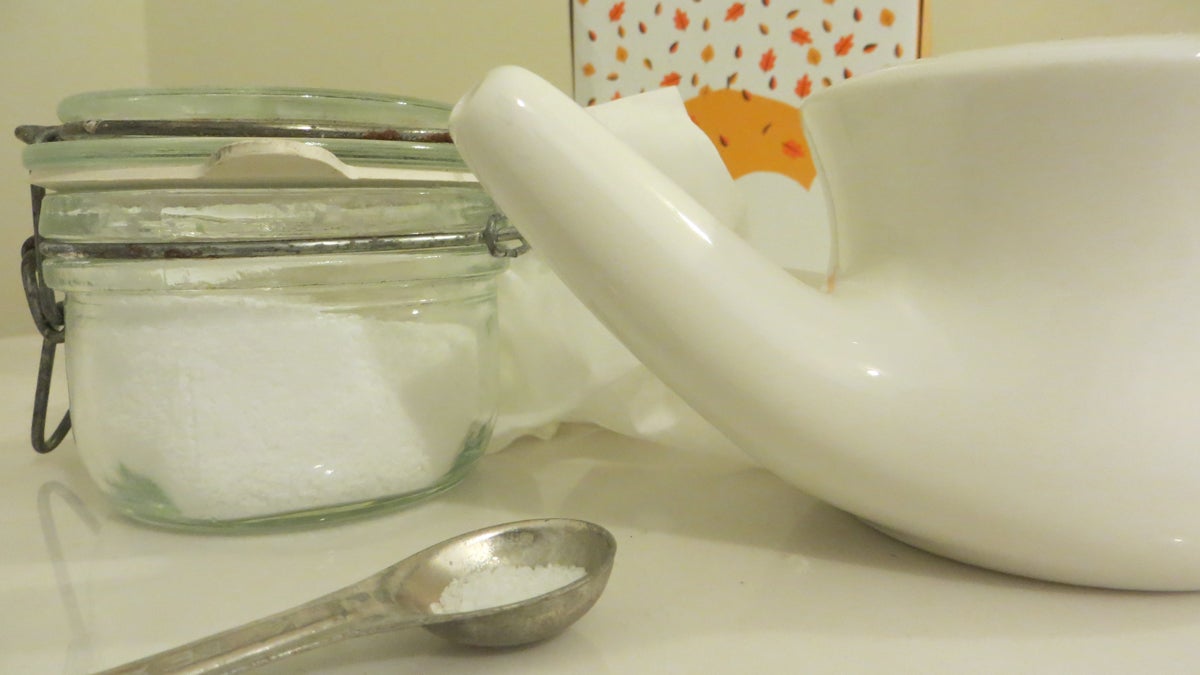Is your neti pot routine safe, effective?
Listen
Many people use a neti pot and salt water to relieve wintertime nose congestion. (Taunya English/for WHYY)
Slosh a little salty water into your nose, and it’s like a satisfying kick in the sinuses.
For some people, nasal irrigation has become part of their daily morning ritual, like brushing your teeth. Other people are convinced it wards off colds. Many say a bracing saline wash offers them relief once their nose becomes congested.
There is little guidance on how to do it safely, and even less science to prove if there’s a real health benefit or harm. So, we asked two physicians to weigh in on this intimate bathroom habit.
Karen Rizzo, an ear, nose and throat specialist in Lancaster, Pennsylvania recommends regular nasal irrigation.
“It enhances nasal hygiene, there’s really no problem with doing it long term,” Rizzo said.
Our other expert, Talal Nsouli, director of Watergate Allergy and Asthma Center in Washington, D.C., says using a saline wash every day is a bad idea.
“People think they are getting better,” he said. “They might improve for one or two days and then they start to get worse.”
Daily regimen
“It’s just like washing your car, if you wash your car every day, it stays clean. If it’s in the fall when there’s lots of ragweed and pollen deposit on it, then you wash it away, and it looks nice and clean,” said otolaryngologist Karen Rizzo. “The same concept with the lining of the nose.”
Ultimately it’s your immune system—and probably the flu shot—that keep you from getting sick. But Rizzo says the nose is part of that system.
When a virus, bacteria, or allergens, pass through the nose, mucous production kicks into overdrive to fight infection or protect the body.
“If you can wash away that agent, before it multiples and spreads, it’s a good thing,” Rizzo said.
Her big warning is: Make sure the whole process is clean to prevention contamination. Start with safe water—distilled water is recommended, and never use tap water. Wash your hands before you begin and sanitize the container.
Many people mix up their saline solution in a small neti pot—a porcelain container that looks like Aladdin’s lamp.
Rizzo prefers the cheap, plastic-squeeze bottles you buy at the drugstore.
“More pressure more volume, and the tip has a curve to it so you can direct it a little easier. More flushing, more cleaning,” she said.
Those bottles can also be microwaved to sanitize them before each use, and then thrown away after a few months.
She says nasal irrigation can also ward off nosebleeds.
“This time of year with cold air and dry heat, it’s important to keep your nose moist,” Rizzo said.
Her other advice is to make sure you angle the tip of the neti pot straight back to avoid hitting the wall in the center of the nose.
“If you hit your septum, you’ll feel it, it will hurt,” she said.
And finally this warning about the nasal wash: “You don’t want it to be too salty, that’s what it comes down to.”
A temporary fix
That’s immunologist Talal Nsouli’s big worry. He says lots of do-it-yourselfers do it wrong when they prepare a nasal wash at home.
“You see atrocities,” Nsouli said. “They mix whatever they want, one teaspoon, two teaspoons, half teaspoon of the salt. They boil their own water. They mix it together. They are not pharmacists,” he said.
“Studies show that when we use saline solution, it inhibits these cilia from moving,” he said.
To be specific, it’s super salty solutions that cripple the cilia. Those hair-like structures wave and beat to sweep mucus from the nose. Nsouli says when the cilia aren’t working properly there’s an unhealthy build-up of mucus that can harbor infection.
“A lot of people are in love with their saline irrigation,” Nsouli said. “If they use it short term, three days, 10 days, that’s totally fine.”
The problem is making nasal irrigation a daily habit, he said. Do it for weeks and weeks, months and months, and you deplete the nose of the natural immune elements, he said.
“We are washing away the bad mucus that someone can have–the yellow, green mucus. And you are washing at the same time the good mucus. This good mucus contains immune elements,” Nsouli said.
Those work together as an anti-microbial–anti-bacterial, anti-viral, and anti-fungal, he said.
“If you put this mucus on a petri dish it will kill the bacteria, it will kill the viruses,” Nsouli said.
Many people try to treat a serious, underlying medical problem with a home remedy, he said.
“We see it almost every week, we have patients coming to our clinic who are extremely sick. And guess what? Ninety percent of them are taking saline solution on a regular basis,” Nsouli said.
Those patients have no intention of giving up their neti pot, until he shows them the results of his study, he said.
For a year, Nsouli tracked patients. Everyone got his usual prescriptions, and regular medical treatment, but he asked a sub-set of patients to stop using saline washes completely. The people who stopped nasal irrigation did much better, they had 62 percent fewer sinus infections.
Looking for a final word, we asked a national doctors group to referee the neti pot debate, but no luck. The American Academy of Otolaryngology—Head and Neck Surgery has not taken an official position on neti pots or nasal irrigation.
WHYY is your source for fact-based, in-depth journalism and information. As a nonprofit organization, we rely on financial support from readers like you. Please give today.



